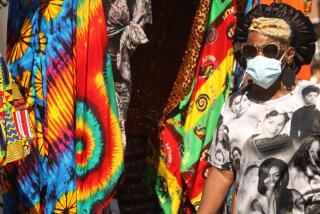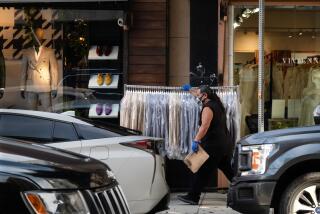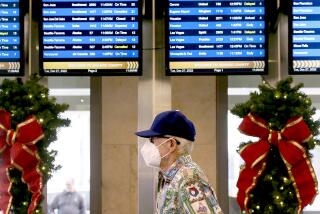Workers vanished as coronavirus swept through L.A. Apparel. Colleagues struggled for answers
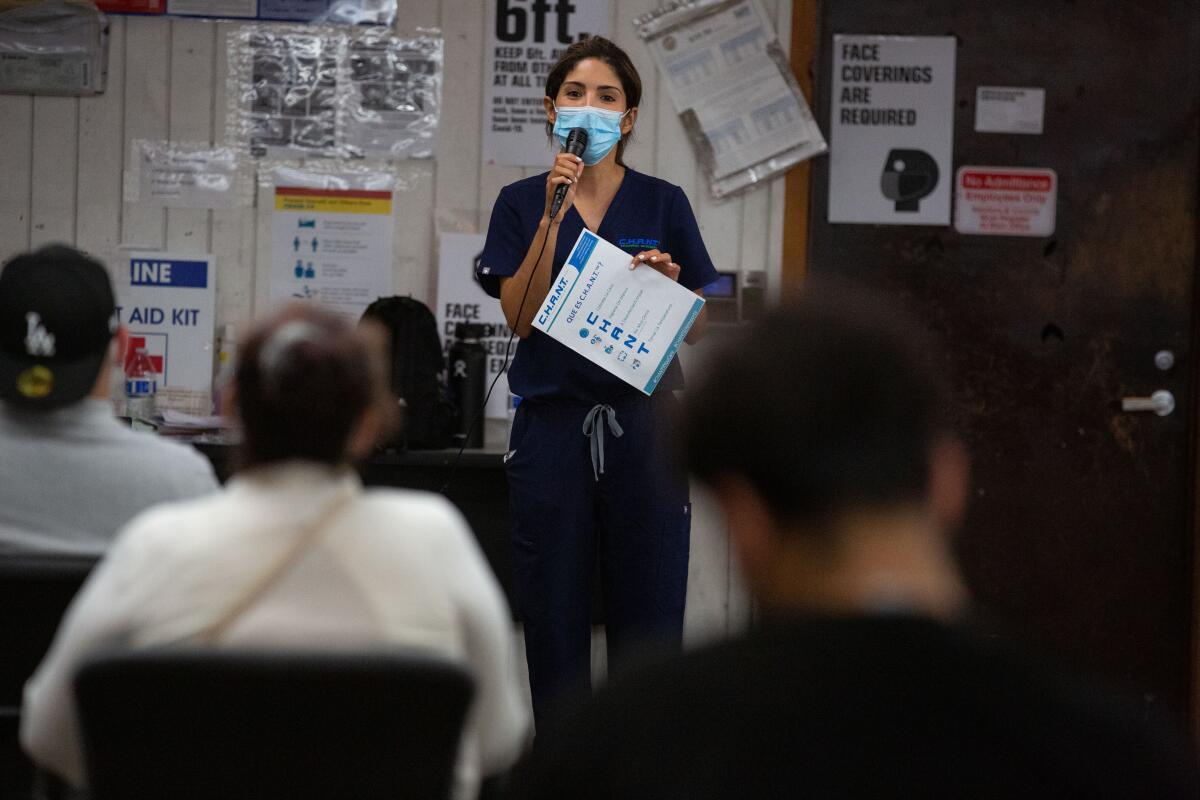
As the months passed, people began disappearing. Chairs once occupied by garment workers inside the Los Angeles Apparel factory sat empty. Rumors circulated about how the missing workers had gotten sick, or even died, of COVID-19.
Mariana, a 56-year-old woman from El Salvador, felt afraid every day. She said workers like herself received little or delayed information from the South L.A. company about positive cases, leaving them to try and deduce why their colleagues had left.
The company’s founder said that as the coronavirus swept through the factory, management informed employees who may have been exposed in a timely fashion. But garment workers who spoke to The Times tell a different story, saying they were largely kept in the dark as colleagues became sick, and the information they did receive was slow to arrive or vague.
One morning in June, after word spread that several employees had died, workers decided to stage an action. Dozens in one of the company’s plants stood by their stations and refused to sew for nearly two hours, demanding better sanitation.
“We got up, and we said we’re not going to work until you promise to clean the machines,” said Mariana, who agreed to be identified by her middle name for fear of retaliation. “We wanted them to practically close the factory so they would clean.”
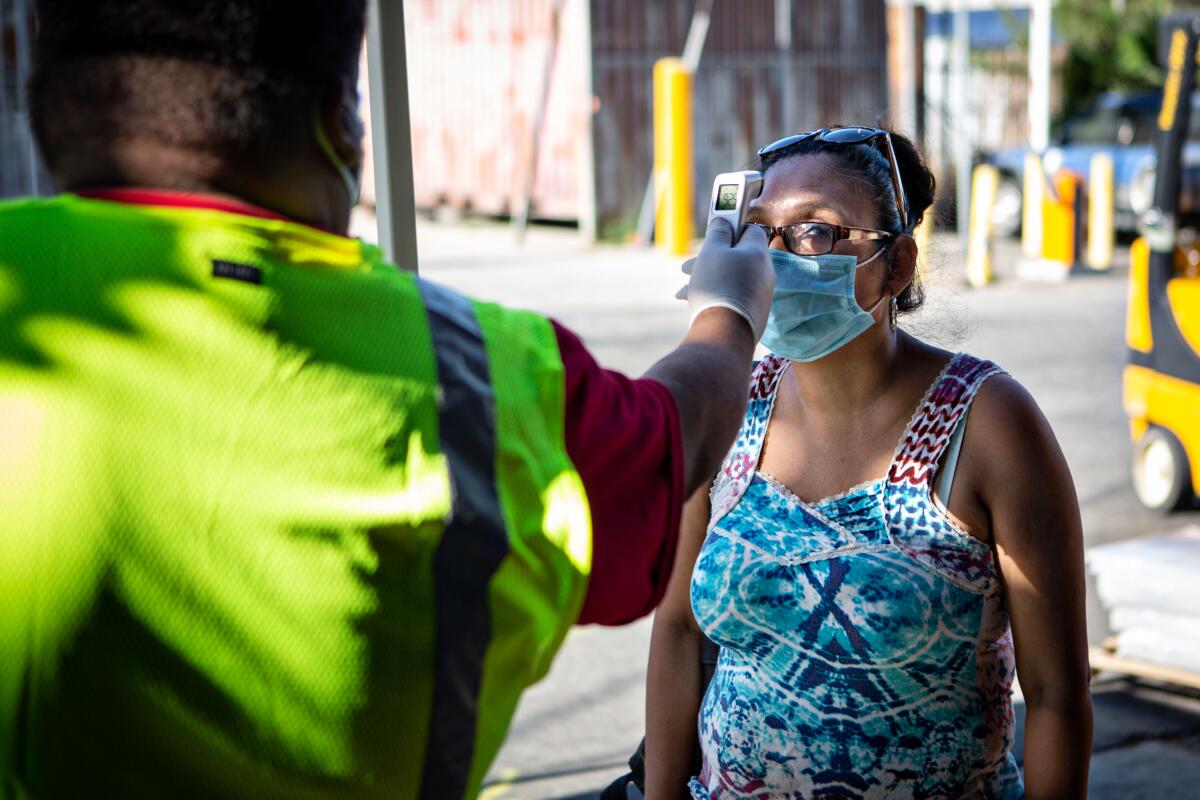
Coronavirus is surging in workplaces across Los Angeles County as the economy reopens. But officials say Los Angeles Apparel suffered the worst coronavirus outbreak of any business in the county, with more than 300 of the factory’s roughly 1,800 employees testing positive. Four have died.
In interviews with The Times in recent days, current and former Los Angeles Apparel workers said the company did not consistently inform them when people got sick, creating a climate of panic and uncertainty. They also said management failed to enforce social distancing and did not adequately train workers on how to stay safe. Vendors were allowed to come into the factory to sell products to workers, they said, heightening the risks.
The L.A. County Department of Public Health said it first shut down operations at Los Angeles Apparel on June 27, after inspectors found “flagrant violations” of infection-control orders and the company failed to cooperate with an investigation of a reported coronavirus outbreak. Last week, the department ordered the continued suspension of operations at the company’s South L.A. buildings until necessary improvements were made.
The state Division of Occupational Safety and Health, Cal/OSHA, opened an on-site inspection in June to investigate a complaint regarding workplace hazards at a Los Angeles Apparel facility, reported by company workers.
The story of Los Angeles Apparel — which shifted to making masks when the pandemic began — underscores growing concerns that California is not doing enough to protect essential workers, many of them in food processing and manufacturing facilities such as garment factories. Black and brown communities have been especially hard hit by COVID-19.
Latinos in L.A. County are now more than twice as likely as whites to contract the coronavirus, and officials believe many of them get sick at work. The majority of workers at Los Angeles Apparel are Spanish-speakers, county officials said.
The company’s founder, Dov Charney, has refuted assertions that the company did not protect its workers and inform them of positive cases. “There was no secrecy,” he said. Charney said workers were told “right away” and encouraged to get tested and quarantine if needed.
“I’m not saying if there was someone in one building, we told the other building, but we told the people who worked proximately to them,” he said.
Charney said the company had conducted temperature checks and maintained proper social distancing, and that higher infection rates in communities like South L.A. would naturally be reflected in a factory there. Moreover, Charney said he believed there were elevated numbers because the company has had all its workers get tested several times. (The county has said its information confirms that only a fraction of workers were tested.)
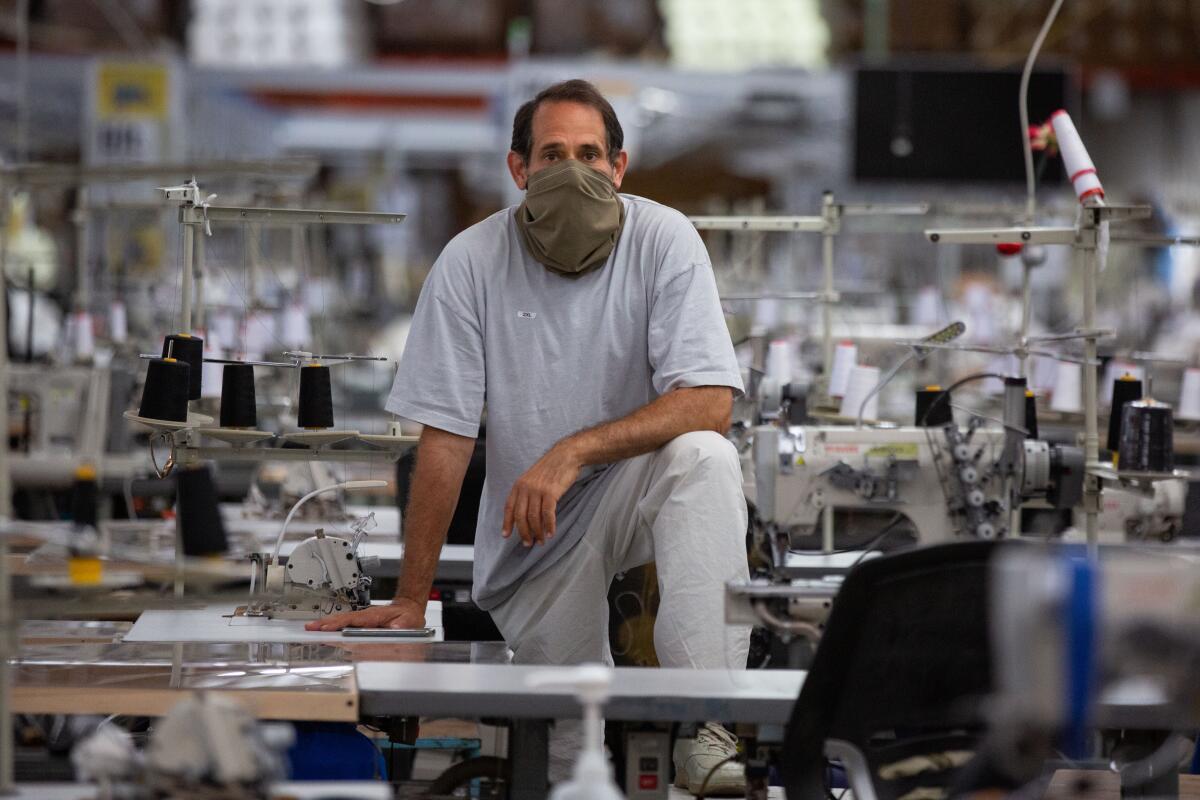
“We believe that at all times — since the launch of the epidemic — we’ve been doing our best in doing social distancing and following every directive we’re aware of,” Charney told The Times last week. “We’re dealing with a massive epidemic that has risen astronomically in our community, in South L.A., and it’s manifested itself in our factory.”
Charney founded Los Angeles Apparel in 2016 after he was ousted from his former business, American Apparel, following allegations of sexual harassment and other misconduct at the company, which he has denied.
Industry experts say the COVID-19 outbreak has highlighted health and safety issues that have long plagued the garment industry in L.A., and that violations are likely much more widespread. The public health department has received at least 19 coronavirus complaints related to the industry, including three about Los Angeles Apparel. It’s currently investigating a coronavirus outbreak at another garment manufacturing facility.
Marissa Nuncio, director of the Garment Worker Center, noted that the type of “insufficient” protections against the virus at Los Angeles Apparel are “most definitely the case or worse in other L.A. garment factories,” many of which are sweatshops employing undocumented immigrants.
“Almost everyone has gotten sick,” said Beto, a 34-year-old Guatemalan garment worker at a small factory in South L.A., where he said mask use is not enforced, and employees are not provided with disinfectant. One employee he was friendly with died after showing symptoms of the virus.
Experts say the virus may spread more easily in factories than other workplaces, since they’re often crowded environments where people touch the same materials. Linda Delp, director of UCLA’s Labor Occupational Safety and Health Program, said pressure to work constantly when earning pay by the piece, as well as inadequate sick-leave policies, may also be contributing factors.
“They’re workers that are already paid low wages, so they don’t have a cushion to depend on,” she said. “Unless they can stay home when they’re sick, when they have been exposed or infected, there’s this real pressure to continue coming to work.”
Three of the coronavirus-related deaths at Los Angeles Apparel occurred in early June and one in early July, officials said.
“There were tremendous numbers of cases, we have the four deaths, and we weren’t getting a response in a timely fashion from L.A. Apparel,” said Jan King, an L.A. County public health officer for West and South Los Angeles.
The department has said a healthcare provider notified it June 19 of a potential outbreak. Health officials asked the company for a list of all employees so they could compare it to testing results the department had received. The company, they said, failed to provide the list after multiple requests. (Charney has said it took time to gather the information.)
During a site visit June 26, the department stated, inspectors observed multiple violations of infection-control protocols, including the use of cardboard as a barrier between workers. King noted that among other violations, disinfectant solution was not readily available, and management was not monitoring social distancing. Workstations, she said, were not six feet apart.
“We observed sometimes when they had employees come in, for instance, to pick up checks, there was not social distancing,” she said. “A lot of companies are putting tape or cones to mark the six feet. That was not being done. If you don’t have that, people have a tendency to bunch up.”
The company, she said, was unable to tell officials where workers had sat, making contact tracing difficult and forcing the department “to determine that everyone that was there was potentially exposed.” It also did not train workers on safety in their primary language, which for most was Spanish, she said. Charney said the company has been providing training sessions this week and that prior to doing so, it communicated to workers how to stay safe.
“We got the message of six feet distancing, the message of not coming to work if you’re ill, the fundamental message that you must wear a mask,” he said. “We communicated those issues.”
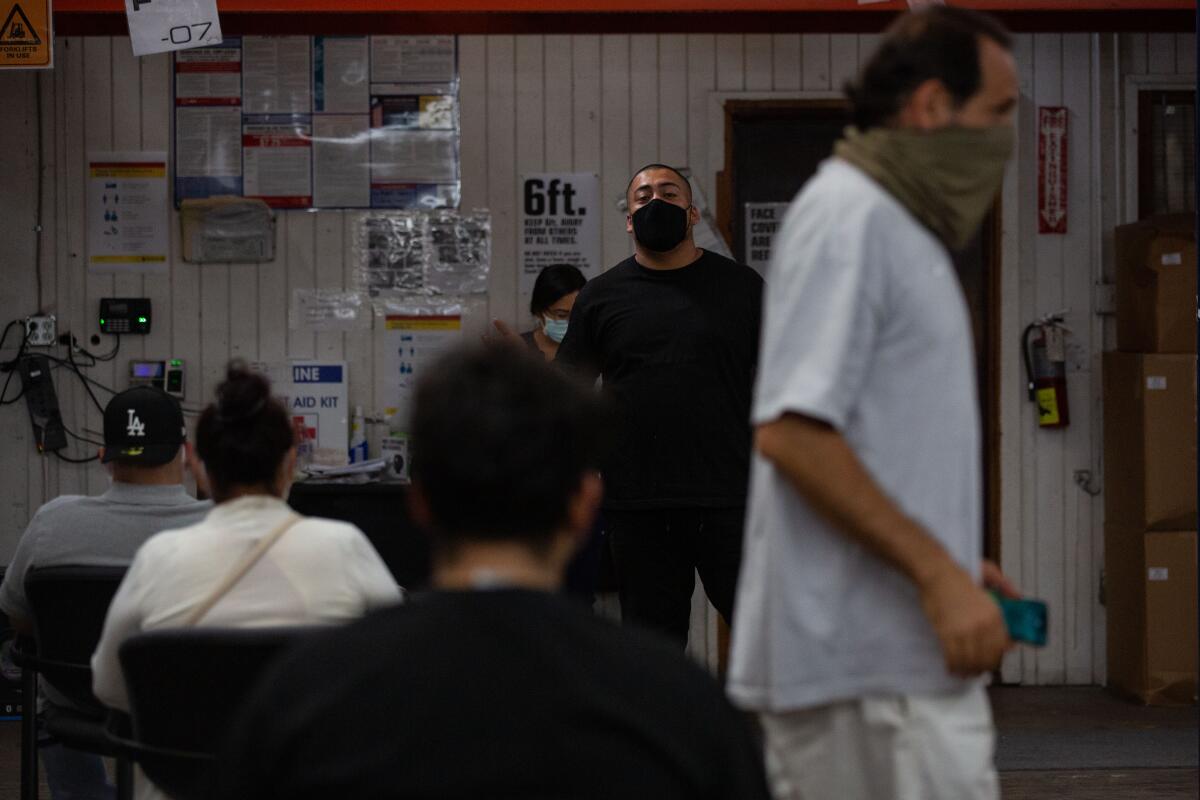
Nuncio at the Garment Worker Center said she began hearing in May from Los Angeles Apparel workers who had gotten sick from the coronavirus. They described how managers would come within six feet of workers and how the factory seemed to allow visitors in without much oversight.
“Vendors would come trying to sell things to employees,” she said. “[Workers] also said that applicants, people looking to apply for work, would come in — that they weren’t preventing that, and there wasn’t protocols in place for those people, whether they maintained social distance, whether they wore a mask.”
Workers said the company didn’t communicate cases of the virus to them, leaving them to suspect that missing employees were sick.
“They were of course concerned and worried it was because of COVID but didn’t get that confirmed,” Nuncio said. “There were rumors about workers passing away, but it wasn’t confirmed.”
Chiara, a 52-year-old woman from Peru who asked to be identified by her last name for fear of backlash, tested positive for the coronavirus after working at the factory for several weeks. When she first felt symptoms in June, it seemed to be “a simple flu.” She worked for a few more days, but after developing a painful headache and feeling faint, she stopped going in. A supervisor advised that she should get tested.
Now, she wonders if she was exposed during her breaks, since she hadn’t made sure that the people who had occupied a lunch table before her had disinfected it. She has questioned whether she should have been better about cleaning her equipment, since she shared it with someone from a different shift.
“We would have taken better care of our health,” Chiara said, had workers been trained on protecting themselves from the virus. But she plans on returning to the factory once it reopens, doubting that she’ll find another job that pays her $14.25 an hour.
“They’re changing things there,” she said. “It gives me security that I’ll be fine there. That’s what I say [now]. I don’t know what will happen.”
But Maribel Maldonado, a 50-year-old Mexican worker who also tested positive for the virus, won’t be coming back.
Maldonado said there wasn’t adequate social distancing when she began working in April as a trimmer at Los Angeles Apparel. She would sit at a makeshift cardboard table with about half a meter separating her from others, causing her to ask if she could distance herself more.
In early May, she said, she worked in an area that lacked ventilation. She sat at a long table where workers tried to maintain distance. At one point, she said, the company added more tables because people were sitting too close together.
She tested positive for the coronavirus shortly thereafter, experiencing headaches and feeling nauseous. She’s now taking online classes to prepare for a new job providing financial services related to life insurance — work she can do without close contact with others.
“I wouldn’t return there — least of all now that I’ve just started to get better,” she said. “It’s too hot there. They aren’t careful about distancing.”
Mariana, who has worked at Los Angeles Apparel for about three years, began wearing two masks as she heard of more and more employees who had gotten sick. Before the county shut down the factory, she would get tested several times a month and would bring her own disinfectant from home.
After the June work stoppage, Charney met with workers. He told them to practice social distancing and that a few employees had tested positive, Mariana recalled.
She has noticed improvements. When Los Angeles Apparel opened briefly last week (the company said it was given permission to open, while officials called it a violation), there were “gallons of disinfectants,” she said. Workers passed around a box to raise money to support the family of a colleague who had died from the virus.
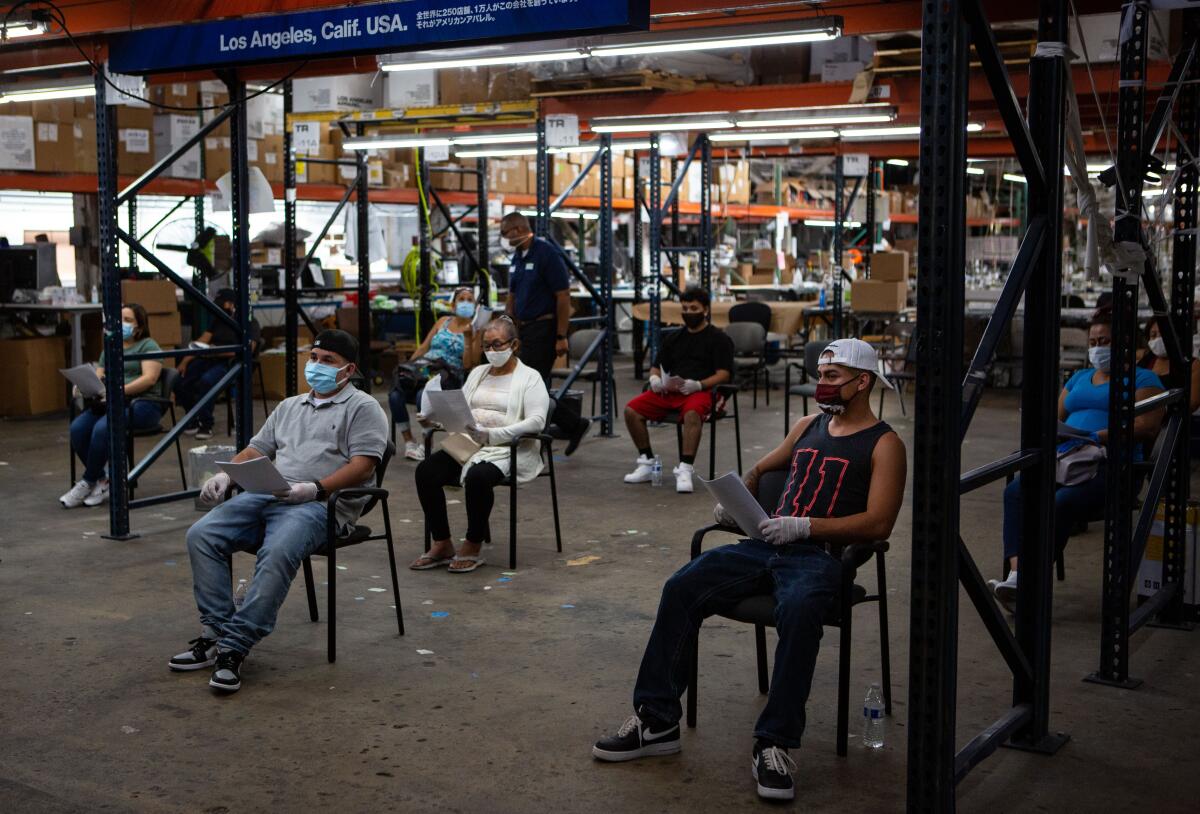
Charney said that the company has added upgrades such as touchless faucets, better ventilation, more robust screening for symptoms and improved training for cleaning staff. The company, he said, has been helping workers to get tested before reopening.
“The opportunity here is, we’re going to have the best factory,” he said. “If this thing lasts for a long time, we have the best opportunity to keep going and keep everybody safe.”
During a safety training session for workers Wednesday at the factory, 11 people sat in socially distanced rows of chairs. Hand sanitizer and gloves rested on a table nearby. A sign glued to the sanitizer said in Spanish, “Masks are required.”
Several instructors presented in English and Spanish, explaining that many Black and Latino people have died from the virus. Workers were to clean shared work spaces and notify supervisors when they didn’t feel well, they said.
“Your job will be here,” an instructor told the group in Spanish. “We’re trying to prevent more people from getting sick.”
When it was time for questions, one man raised his hand.
“Can you get the virus if you touch someone with the virus?” he asked.
A few seconds later, he had an answer from the instructor. Yes, there was a risk.
More to Read
Start your day right
Sign up for Essential California for news, features and recommendations from the L.A. Times and beyond in your inbox six days a week.
You may occasionally receive promotional content from the Los Angeles Times.
